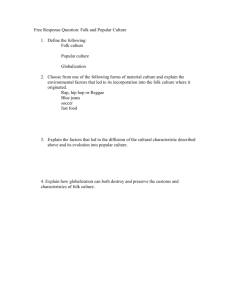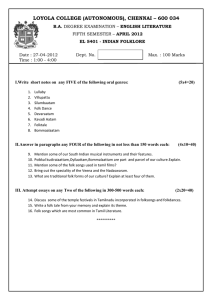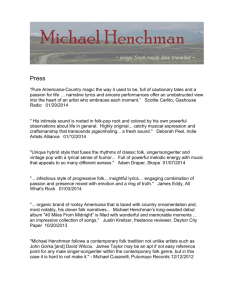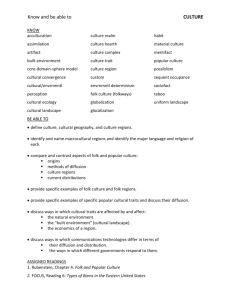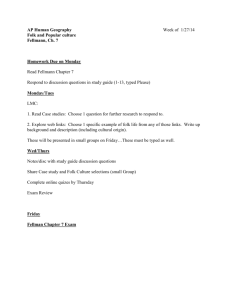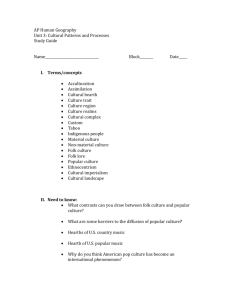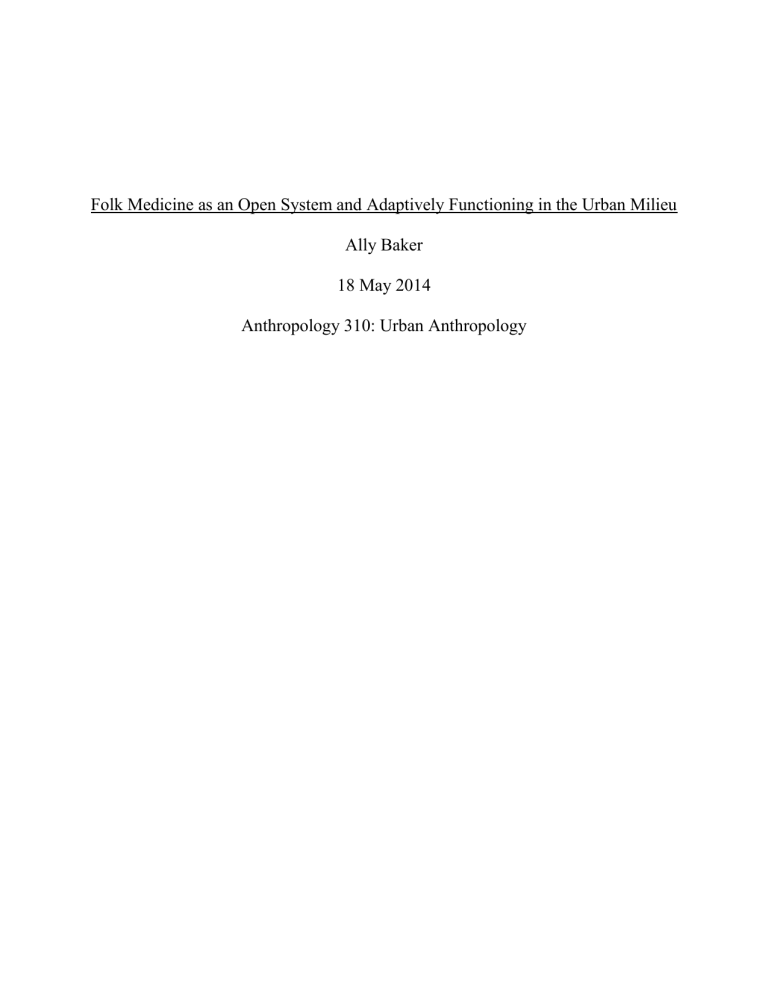
Folk Medicine as an Open System and Adaptively Functioning in the Urban Milieu Ally Baker 18 May 2014 Anthropology 310: Urban Anthropology Contextualization Defining Modern Medicine, Folk Medicine, and Folk Illness Irwin Press defines folk medicine in three ways of variance. Mainly, its variance with modern, scientific, official, authorized, literate medical traditions of a community or nation (Press 1978:72). He adds that folk practices are shared knowledge with the public (Press 1978:72). Folk medicine is often a term used for all folk practices and beliefs that look for a cure through folk concepts, instruments, practices, and people (Press 1978:72). Folk illness refers to the concepts and manifestation of the disease (Press 1978:72). Folk medicine may far outlast folk illness, as the practice of folk medicine can adapt to different environments and can also treat non-folk-illnesses. Modern medicine is considered a closed system in which defined, inflexible knowledge, and procedures to find a diagnosis (Press 1978:71). This means most of the diagnosis and cures come from evident facts rather than a patient’s needs. Modern medicine is typically expensive and unavailable to new migrants and low economic urban dwellers (Press 1978:71). Analysis Introduction Irwin Press states that folk health systems are open, and therefore adaptive, systems (Press 1978:71). In this way, folk medicine prevail in response to urban socioeconomic characteristics. This article evaluates folk illness and folk medicine in both its rural and urban contexts. The functions of folk medicine are prevalent and similar in both rural and urban milieus. Through this assessment, and a comparison to modern medicine, it is indicated that folk medicine is adaptable to different environments and cultures. Folk practices are strong and adaptable to the illnesses and their functions in the urban milieu of modern medical and welfare systems. Folk Illness and Practice in Rural Setting Rural settings and communities are underdeveloped and nonindustrial areas. Rural settings are extremely unhealthy environments with parasites and other diseases. Lacking modern medical facilities, folk practices and medicine are often the only available source for remedies. In a rural setting, folk illnesses deal with both disease and social drama (Press 1978:75). Through social drama, folk illness allows for alleviation of accountability of failure and instigates economic leveling (Press 1978:76). Folk Illness and Practice in Urban Setting Urban life has copious amounts of diseases, and migrants are particularly susceptible to these new diseases. Higher rates of disease for migrants are also contributed to social, cultural, and economic marginality. Studies show that low socioeconomic status contributed to poor health because of poorer quality nutrition, sanitation, and living quarters (Press 1978:74). If medical facilities are available in low-income neighborhoods, it tends to be costly and inconvenient. Folk medical systems are present in the urban setting for the same reason as in a rural setting. Providing a cure and medicine in areas without affordable and convenient modern medical services. Folk medicine minimizes the traumatic experience and illnesses that come with migrating to a completely different culture and environment (Press 1978:75). Modern medical procedures may deny god, family roles, history, culture, and does not take cues from the patient’s needs. The adapted folk medicine system to the urban milieu allows for patients to feel modern, while still keeping tradition and keeping with familiar concepts, remedies, and healing personnel (Press 1978:76). Illness of Failure and Sorcery in Urban Milieu A very prevalent theme in illness is that which results from failure, resulting in lessening attempts at achieving (Press 1978:77). In the city, folk illness may not play as important a role in economic leveling. This is believed to be the reason for a lack of sorcery, and thereby, a lack of envy and aggressive behavior, in the urban milieu (Press 1978:77). This may be because of a lack of folk illness and misfortune that are highly present in rural settings. Most possessions are attainable, thus no need for socioeconomic leveling, aggression, and envy. Sorcery has adapted to act and cure the excuse for failure, instead of socioeconomic leveling, in the urban milieu. Urban Curers Reliance on Patient’s As an open system, the patient is more responsible than the urban curer for reporting illness and social relevance to their problem. Most curers do not evaluate the patients current conditions but rely on the patient to relay them (Press 1978:76). Other Works This article fills in the gaps of other works about migration and poverty read in Urban Anthropology class 310. The Extended Community: Migration and Transformation in Tzintzuntzan, Mexico evaluated extended communities and patterns of migration that the Tzintintzuntzeno’s create so that when joining a new community, they don’t lose a sense of self. Modern medicine is one way that new migrants could lose themselves (Kemper 2010: 285-286). Lewis’ The Culture of Poverty shows the adaptions to hard times and poverty, which is the case for migrants moving from rural conditions to low-income neighborhoods (Lewis 2010:175-176). Both the migrant and folk medical system adapt to a new environment and different culture of poverty. Most of the articles we read show the drastic differences in characteristics and systems in rural and urban settings, or the individual challenges and changes involved with assimilation. This article shows how folk medicine can be applied in both milieus. I wish to have read more about topics such as these, the adaptions of systems settings, in class. I found the assimilation and adaptation of folk medicine from a rural to urban setting interesting. However, there wasn’t much backing or sites for this information. It seems most were outside sources, with a few briefly mentioned instances of personal fieldwork and findings. I wish there were facts backing his findings. Conclusion Through evaluating folk illness and folk medicine in both its rural contexts and urban milieu, it is likely that folk medicine are adaptable to different environments and cultures because it is an open system. An open system, which is one that relies more on the patient’s diagnosis and manifested needs, allows for an adaptable system. Folk medicine and practices in the city are more practical, affordable, available, convenient, and serves familiar ideational outlet for new migrant opposed to modern medicine in the city. Typical functions, such as aggression displacement, relieving stress, and role maintenance and leveling are common in both rural and urban milieus, although function in differing ways. Evidence suggests that folk medicine and practices are flexible and open, as they are able to meet the needs of urban residence. Folk practices are strong and adaptable to the illnesses and their functions in the urban milieu of modern medical and welfare systems. Works Cited Kemper, Robert V. 2010 The Extended Community: Migration and Transformation in Tzintzuntzan, Mexico. In Urban Life: Reading in the Anthropology of the City Fifth Edition. George Gmelch, Robert V. Kemper, and Walter P. Zenner, eds. Pp. 285-286. Waveland Press, Inc. Lewis, Oscar 2010 The Culture of Poverty. In Urban Life: Reading in the Anthropology of the City Fifth Edition. George Gmelch, Robert V. Kemper, and Walter P. Zenner, eds. Pp. 175-176. Waveland Press, Inc. Press, Irwin 1978 Urban Folk Medicine: A Functional Overview. American Anthropologist, New Series, Vol. 80, No. 1.: 71-84.
